The Táin Bó Cúailnge, or "The Cattle Raid of Cooley," is a cornerstone of Irish mythology and the Ulster Cycle, an epic tapestry of valor, betrayal, and mythic heroism. At its heart lies the saga of Queen Medb’s desire to possess the greatest bull in Ireland and the heroic feats of Cú Chulainn, who defends his homeland against overwhelming odds. This tale is a dramatic collision of pride, power, and the resilience of a single warrior standing against an entire army. The story begins in the royal palace of Connacht, where Queen Medb and her husband, King Ailill, engage in a heated debate about their respective wealth. The contest is fierce and highly competitive, as both rulers take great pride in their possessions. However, Ailill claims superiority because of his ownership of the magnificent white bull, Finnbhennach, which had defected from Medb’s herd to his. Determined to match her husband's prestige, Medb learns of Donn Cúailnge, a brown bull of extraordinary strength and beauty owned by Dáire mac Fiachna of Ulster. Medb resolves to acquire this bull to prove her equality, vowing to secure it through either diplomacy or force. She sends emissaries with lavish gifts and generous offers, and Dáire initially agrees to lend the bull to Connacht. However, the deal collapses when one of Medb’s envoys drunkenly boasts of their intent to take the bull regardless of Dáire's consent. Outraged, Dáire refuses, setting the stage for a full-scale invasion of Ulster. As Medb musters her vast army, Ulster is left vulnerable due to the curse of Macha, a goddess wronged by a past ruler of the province. Macha had cursed the warriors of Ulster to suffer pangs of childbirth in their time of greatest need. This supernatural affliction incapacitates nearly all of Ulster’s men, rendering the kingdom defenseless against the invading forces of Connacht. Only one warrior remains unaffected: Cú Chulainn, a youthful prodigy with divine lineage and extraordinary abilities. Despite his youth, Cú Chulainn possesses unmatched combat skills, ferocity in battle, and the mysterious power of the ríastrad, a "warp-spasm" that transforms him into an almost monstrous figure of destruction. Recognizing the gravity of the situation, Cú Chulainn vows to defend Ulster single-handedly until his comrades recover. As Medb's army advances into Ulster, Cú Chulainn employs guerrilla tactics to slow their progress. He initiates the féinnid, or single combat, a tradition that requires a champion from each side to face off in a duel. Day after day, Cú Chulainn challenges and defeats Connacht’s finest warriors, using both his skill and cunning to whittle down their numbers. One of his earliest victories is against Orlam, a prominent Connacht warrior, whom he slays with his legendary spear, the Gáe Bulg. Cú Chulainn's prowess becomes so terrifying that Medb's forces begin to lose morale, despite their superior numbers. Yet Medb remains undeterred, resorting to deceptive tactics to trap or overpower Cú Chulainn. One of the most poignant episodes of the Táin is the duel between Cú Chulainn and Ferdia, his foster brother and dearest friend. Medb manipulates Ferdia into fighting Cú Chulainn, exploiting his sense of honor and loyalty to Connacht. The two warriors meet at the ford, where they engage in a brutal battle that lasts for three days. Both men fight valiantly, showcasing their unmatched skills and deep respect for one another. On the final day, Cú Chulainn is forced to use the Gáe Bulg, a barbed spear that inflicts mortal wounds, to defeat Ferdia. As Ferdia falls, Cú Chulainn cradles his dying friend, overcome with grief and lamenting the tragic necessity of their fight. Despite Cú Chulainn’s relentless efforts, the Connacht army pushes deeper into Ulster. Medb herself demonstrates cunning and resourcefulness, using ambushes, decoys, and psychological tactics to weaken Ulster’s resistance. She sends spies and scouts to gauge Cú Chulainn’s movements, but the young hero continues to outwit them at every turn. Medb’s ultimate goal is to capture Donn Cúailnge, and her forces succeed in locating the prized bull. However, Medb underestimates the will of the Ulstermen, who begin to recover from Macha’s curse as the conflict drags on. The climax of the Táin unfolds when Donn Cúailnge, now in Connacht's possession, encounters Finnbhennach, the white bull of Ailill. The two bulls engage in a ferocious battle that echoes the larger conflict between Connacht and Ulster. The fight is a spectacle of raw power and fury, with the animals wreaking havoc across the land. Donn Cúailnge ultimately triumphs, goring Finnbhennach to death. However, the victory is bittersweet, as Donn Cúailnge succumbs to his injuries and dies shortly after returning to Ulster. The loss of both bulls symbolizes the futility and cost of the war. As the warriors of Ulster regain their strength, they launch a counteroffensive against Medb's forces. Led by their king, Conchobar mac Nessa, they confront the Connacht army in a final, decisive battle. The conflict is fierce and chaotic, with both sides suffering heavy casualties. Cú Chulainn, though exhausted from his earlier exploits, continues to fight with unparalleled determination. His heroism inspires the Ulstermen to rally, turning the tide of the battle. Faced with mounting losses and the collapse of her plans, Medb is forced to retreat, marking the end of the war. The Táin Bó Cúailnge concludes with a reflection on the consequences of pride and ambition. Medb returns to Connacht, her quest for supremacy unfulfilled. Ulster, though victorious, is left to mourn the toll of the conflict, including the tragic deaths of Cú Chulainn’s friends and allies. The tale of the Táin endures as a testament to the resilience of the human spirit and the cost of unbridled ambition. It has been preserved in the oral tradition and later immortalized in manuscripts like the Book of Leinster. Today, it remains a cornerstone of Irish literature and culture, celebrated for its rich characters, dramatic narrative, and profound themes.The Catalyst of Conflict: A Royal Rivalry
The Curse of Macha: Ulster’s Peril
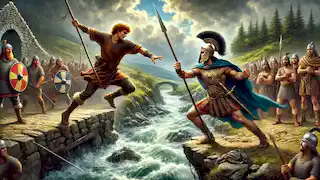
Cú Chulainn’s Heroic Defense
The Duel of Friendship: Cú Chulainn vs. Ferdia
The Connacht Army’s Advance
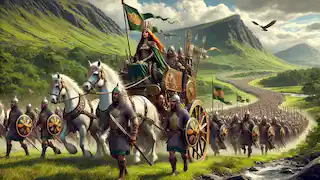
The Bull's Tragic Battle
The Return of the Ulster Warriors
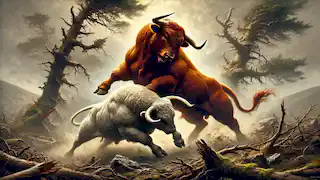
Aftermath and Legacy
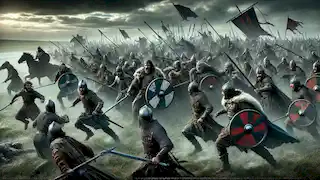
A Tale of Epic Proportions
Reading Time: 6 min
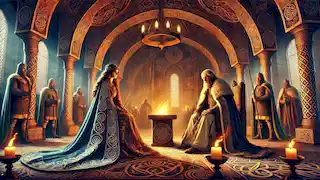
About Story: A Tale of Epic Proportions is a Myth Stories from ireland set in the Ancient Stories. This Dramatic Stories tale explores themes of Courage Stories and is suitable for All Ages Stories. It offers Cultural Stories insights. A mythic tale of heroism, loyalty, and the pursuit of power in ancient Ireland.

















